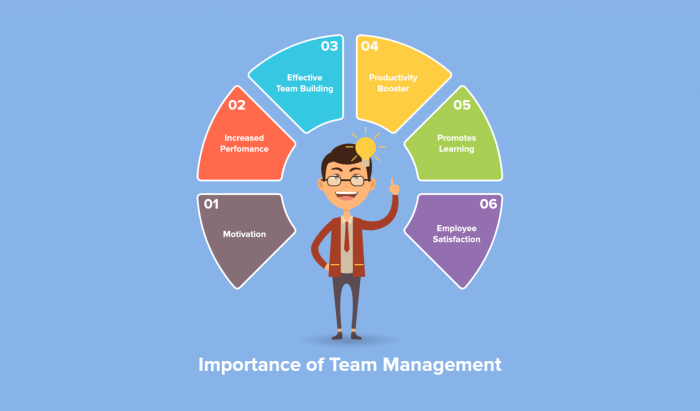Team Management Skills are crucial in today’s professional world, shaping the way teams function and achieve success. From effective communication to conflict resolution, these skills are the backbone of strong leadership. Get ready to dive into the essentials!
Importance of Team Management Skills

Team management skills play a crucial role in a professional setting, as they are essential for ensuring the success and productivity of a team. Effective team management skills can make a significant impact on the overall performance and outcomes of a team.
Enhanced Productivity
When team members are well-managed, they are more likely to work cohesively towards common goals. This can lead to increased productivity, as tasks are completed efficiently and effectively. A team with strong management skills can delegate tasks appropriately, prioritize work effectively, and ensure that deadlines are met consistently.
Positive Work Environment
Team management skills also contribute to fostering a positive work environment. When team members feel supported, valued, and motivated by their managers, they are more likely to be engaged and satisfied with their work. This can lead to higher levels of morale, teamwork, and collaboration within the team, ultimately creating a more positive and productive work environment.
Essential Team Management Skills
Effective team management requires a combination of key skills that are essential for successful leadership. Among these skills, communication skills and conflict resolution skills play a crucial role in ensuring team cohesion and productivity.
Communication Skills
Effective communication is the cornerstone of successful team management. It involves the ability to clearly convey information, actively listen to team members, provide feedback, and ensure that everyone is on the same page. Strong communication skills help in setting expectations, assigning tasks, and resolving conflicts within the team. Without effective communication, misunderstandings can arise, leading to lowered morale and decreased productivity.
- Active Listening: Listening attentively to team members’ concerns and feedback is essential for building trust and fostering a positive working environment.
- Clarity and Transparency: Clearly articulating goals, expectations, and feedback helps in avoiding confusion and ensuring that everyone is aligned towards a common objective.
- Feedback and Recognition: Providing constructive feedback and recognizing team members’ contributions are vital for motivating and engaging the team.
Conflict Resolution Skills, Team Management Skills
Conflict is inevitable in any team setting, but how it is managed can make a significant difference in team dynamics. Conflict resolution skills enable team leaders to address disagreements, misunderstandings, and differing opinions in a constructive manner, leading to better outcomes and stronger team relationships.
- Emotional Intelligence: Being able to understand and manage emotions, both your own and others’, is crucial for resolving conflicts peacefully and maintaining a positive team atmosphere.
- Problem-Solving: Approaching conflicts with a problem-solving mindset helps in finding mutually beneficial solutions and moving past differences effectively.
- Mediation: Acting as a mediator between conflicting parties and facilitating open dialogue can help in reaching resolutions that satisfy all team members.
Strategies for Developing Team Management Skills
Developing team management skills is crucial for effective leadership and successful project outcomes. Here are some practical strategies to enhance your team management skills:
Training Programs
- Participate in leadership workshops and seminars to learn new techniques for managing teams effectively.
- Enroll in online courses or certifications specifically focused on team management and leadership skills.
- Seek mentorship from experienced leaders in your field to gain valuable insights and guidance.
Enhancing Delegation Skills
- Identify the strengths and weaknesses of each team member to delegate tasks effectively based on individual capabilities.
- Establish clear expectations and deadlines for delegated tasks to ensure accountability and successful outcomes.
- Provide necessary support and resources to team members to empower them to complete delegated tasks efficiently.
Importance of Feedback Mechanisms
- Regularly communicate with team members to provide constructive feedback on their performance and progress.
- Encourage open communication and feedback within the team to address any challenges or issues effectively.
- Implement feedback mechanisms such as performance reviews or team meetings to evaluate team dynamics and identify areas for improvement.
Challenges in Team Management: Team Management Skills

Managing a team comes with its own set of challenges that can make the process difficult. From communication barriers to conflicts within the team, managers need to be equipped with strategies to overcome these obstacles effectively.
Communication Barriers
- Ensure clarity in communication by providing specific instructions and expectations to team members.
- Encourage open communication channels within the team to address any misunderstandings promptly.
- Utilize various communication tools and techniques to bridge the gap between team members working remotely or in different locations.
Handling Conflicts
- Promote a culture of respect and understanding within the team to prevent conflicts from escalating.
- Encourage active listening and empathy when resolving conflicts between team members.
- Implement conflict resolution strategies such as mediation or compromise to reach a positive outcome.
